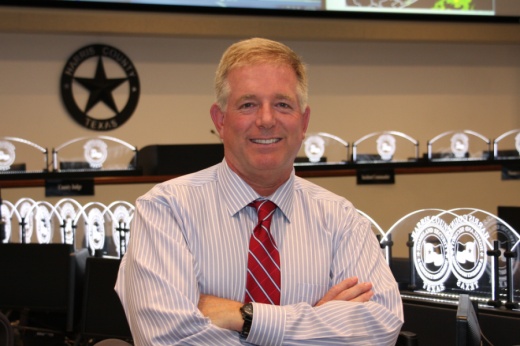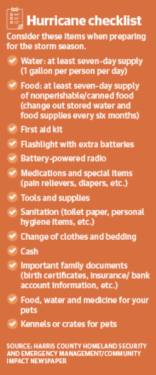How can a community best prepare for and respond to a hurricane-like event?
It starts with the individual. If I can take care of myself and my family and protect my property, then I am in a much better position to not ask for assistance, but to be able to provide it.
And that assistance may be as simple as checking on our neighbors because they might be seniors who have sustained damage on their property, or they may need a meal or some availability of water. There are just so many little things that we can do for each other. There have been success stories over the years going back to [hurricanes] Katrina and Rita, and it’s been about neighbors helping neighbors. We’ve always said that, and it’s something we take pride in, especially in the Houston-Harris County region.
After any particular hurricane, in what ways could a neighborhood move forward in the recovery process?
As we work through an emergency situation or disaster, it’s about knowing where to get timely, accurate, actionable information. And that can be from their local emergency management office, but it could also be from within their neighborhood and if they have a homeowners association. Sometimes there is a website that provides information on what’s happening directly within their own little neighborhood or their homeowners association and their community. It could be from an apartment complex email account.
Information from these sources could be about road closures that are in the area or even within their neighborhood to downed trees to information on just understanding the debris management process of sorting white goods and their vegetation versus other products within their home as they begin that recovery process. It’s also important to understand how things get picked up from their city and county in times when there’s damage to personal property and those kinds of things that are going to get picked up.
So timely and accurate information becomes crucial. It can be from your local media source, but if you are without power, you might not be able to watch TV. It could be the sharing of information, sometimes via social media/text messaging, but understand that it has to be a trusted source.
What are the most common misconceptions you hear when dealing with hurricane preparation?
That the hurricane is going to turn. ‘It won’t happen. It won’t impact me. It’s not as bad as they say it’s going to be.’ What we need to do is prepare for the worst and hope for the best. Because a lot of times, everybody hopes that when the storms come up this way, they usually turn and go towards Louisiana, and that’s what I’m hoping for. ... Hope is not part of our preparedness plan.
I get that a lot, that question of, ‘Do I think it’s really going to get that bad?’ And after every storm, we hear all the time that this has never happened. That, ‘I’ve lived here for 30 years, and I’ve never seen this happen before, or I didn’t think it could be this bad.’ ... And the truth is, if you live in Harris County, you’re susceptible to flooding. Unfortunately, it takes a storm like [Hurricane] Harvey to prove that everybody is susceptible, but it doesn’t take a Harvey to flood a neighborhood. It can happen in isolated areas, as we saw during the Tax Day floods. Sometimes it doesn’t happen in our neighborhood, but it’s very important that we have flood insurance, especially as we come to hurricane season, when you need to have those insurance policies in place 30 days prior to an event occurring.
Preparedness is not a six-month job. It’s, unfortunately for us, 12 months of the year we should be prepared. What is the one thing Harris County residents should have when it comes to hurricane preparedness?The most important thing that each resident in Harris County should have is a plan. That’s it. And their plan is going to have to be adapted to their household and their particular need. I might be single, and that plan is going to be pretty straightforward because I know what I need for myself. But I might also have loved ones, family members, two dogs, my mother-in-law living with me, and I need to have a much bigger plan and thought process of what I need to do in case I have to evacuate or if I’m staying. What do I need in order to survive for seven days?
What would you tell new residents with little experience in hurricane preparation?
We are very close to the Gulf of Mexico, and storms will develop very quickly. The situation isn’t going to always be like watching a hurricane come off the coast of Africa, drift across the Atlantic, and wait 10 days for it to make up its mind. Sometimes what will happen is that we will have less than 24 or 36 hours to react and be ready.
That’s not the time to run to the store and start preparing or protecting your property because too many times we see lines at the stores or there’s nothing left on the shelves because it was just-in-time preparedness. We can be better than that as a community of 4.9 million people in Harris County and 6 million in our region.






